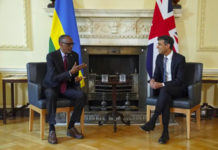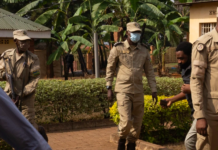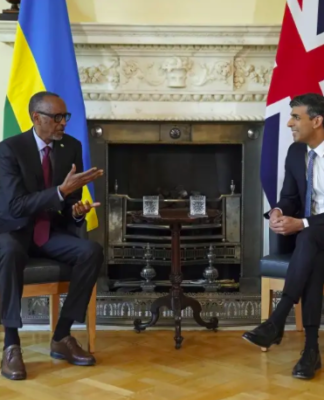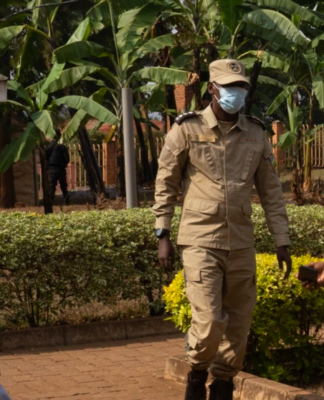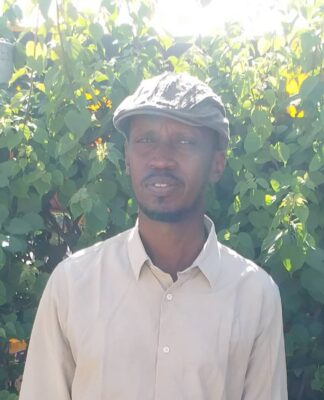
By Didas Gasana
My attention was drawn to an essay by my good friend Jean Rukika in the Rwandan, in which he made very apt arguments. The London-based Jean Rukika avers rightly that:
“Unshaken dictatorship has generated fear, distrust, panic, suspicion and despair among Rwandan people to such extent that a husband is no longer trusting his wife, a father fears his son and friends can’t get straight to the point while talking about the country’s political life.” My friend goes ahead to suggest that: “this dictatorship-related syndrome has infected Rwandan politicians and opposition parties in exile. The would-be liberators of the masses do not trust each other and there seems to be a continual counter-opposition race among themselves! Yet, such behaviour amounts to folly because it has nothing to do with the common goal we all share which is to bring down dictator Paul Kagame and restore our country to good governance and lasting peace! We know well that Kagame sends his operatives to rise chaos and create divisiveness among his opponents abroad, and these operatives disguise themselves into party members. But if experience remains the best teacher, Rwandan freedom fighters should fly beyond Kagame’s pesters and do the due thing.”
To close his rather well-founded argument, the author states:
“Recently a rebellion of FLN sabotaged security in the South of Rwanda and this served as the unparalleled opportunity to check on the abilities of the opposition to topple the Kagame dictatorship. Many opponents opposed themselves to FLN’s guerilla and others published writings falsely declaring that the daring exploits of FLN belonged to them. Now it’s high time to put down our differences and come together to achieve desired change, genuine reconciliation and solid unity in Rwanda. If CNRD, RRM and PDR Ihumure have intertwined their forces to create FLN, let FDLR, RNC, FDU Inkingi, PS Imberakuri, Ishema Party, PDP Imanzi and so on either proceed together or separately providing that their target be one: To overthrow the current antidemocratic government of the RPF. You cannot expect to earn victory out of conflicting forces. Even if Rwandan opposition parties can’t sum up in a single party, they should reckon that their common agenda is to bring democracy in our land of birth cost what it may!”
In Jean Rukika’s essay, I find a very good philosophical lesson. If I may expound, with the words of wisdom of Kampala Lord Mayor’s recent essay, no successful history of any liberation movement has ever been recorded when would be liberators go for each others’ necks. If South Sudan isn’t a livid example, Burma should.
As Lukwago rightly argues, Rosa Louis Parks earned herself a world acclaim as the “Mother of the Civil Rights Movement” because of one simple act of defiance. At the age of 42, in 1955 parks played a pivotal role in the Montgomery Bus boycotts when she recalcitrantly refused to surrender a bus seat to a white passenger as required under the segregation laws.
That simple act of defiance triggered the first organized actions in the Civil rights movement, with cascading effects in the US and beyond. It immediately sparked off a 381 day bus boycott led by a then 26 year old Rev. Dr. Martin Luther, King Junior and ultimately to a nine year March or Civil disobedience that forced the white supremacists to make concessions.
The Civil Rights Act of 1964, which codified the court decision in Brown Vs. Board of Education outlawed the “Separate but equal” policy against the black Americans and ushered in a new political dispensation that recognized the rights of blacks to participate in the political processes of the United States of America. History has never recorded even a single incident where Martin Luther King Junior ever clashed with Rosa parks over the leadership of the civil liberties movement. Until his assassination in Memphis in 1968, Martin Luther King Junior respected and honored Rosa parks as a pillar and icon of civil liberties movement. Throughout the struggle there was no debate as to who of the two would be the President of the United States of America. Indeed none of them had the opportunity of occupying the White house notwithstanding the fact that Rosa died at the age of 92 in 2005.
Neither was there any pressure mounted on either of the two icons of civil liberties to yield space. They both played a complementary role, re-enforcing each other’s efforts with the resultant effect manifesting itself in the “Obama Mania” that gripped America and the world during our generation.
Lord Mayor Lukwago is on the mark when he argues that “Until 2010, nearly all Tunisians perceived Zine El Albidine Ben Ali as an invincible despot who had ruled the country with an iron fist for over two decades, having seized power in a coup in 1987. He had organized regular elections that always returned him with over 90% of the votes, the last one being that of 2009.” It took a 26-year-old street vendor to do a heroic act of self-immolation which ignited a revolution described by many analysts as the most dramatic in the Arab World.
Tarek El-Tayeb Mohammed Bouazizi, a fruit vendor in a small dusty provincial town of Sidi Bouzid was overcome by a feeling of disconsolate and decided to set himself on fire on 17th December 2010 at the provincial government building in protest against a repressive regime that had confiscated his merchandise and impoverished majority of Tunisians. This act sparked off mass protests across the entire country, bringing together political actors of different persuasions, civil society organisations, clerics, activists which forced Ben Ali to flee to Saudi Arabia with his family in 28 days.
During the 28 days of intense pressure and mass action, key political actors never jostled for leadership positions until Ben Ali’s autocratic regime was brought down. Obviously Bouazizi never lived to partake of the spoils of the struggle but left a towering legacy as the progenitor of the Arab spring and was post-humously showered with different accolades including a Tunis postal stamp and being declared “a heroic martyre of middle Eastern Revolution”. His family members, including a one Ali, a re-known journalist with Aljazeera TV and close political associates never sought to patent the revolution to the exclusion of others.
In his autobiography, the long walk to freedom, Nelson Mandela explains in chapter 33 how the catastrophic Sharpeville massacres of March 1960 compelled the hitherto rivalling anti-apartheid formations–ANC and pan Africanist congress (PAC) – to bury their hatchet. During its annual delegates conference of December 1959, the ANC had resolved to launch massive anti-pass demonstrations across the entire country. PAC, then led by Robert Sobukwe sought to upstage or sabotage the ANC program by organizing parallel activities as Mandela explains on page 279;
“The PAC at the time appeared lost; they were a leadership in search of followers, and they had yet to initiate any action that put them on the political map. They knew of the ANC’s ati-pass campaign and had been invited to join, but instead of linking arms with the congress movement, they sought to sabotage us. PAC announced that it was launching its own anti-pass campaigns on 21st March 1960, ten days before ours was to begin. No conference had been held by them to discuss the date, no organizational work of any significance had been undertaken. It was a blatant case of opportunism. Their actions were motivated more by a desire to eclipse the ANC than to defeat the enemy. Four days before the scheduled demonstration, Sobukwe invited us to join with the PAC. Sobukwe’s offer was not a gesture of unity but a tactical move to prevent the PAC from being criticized for not including us. He made the offer at the eleventh hour, and we declined to participate.”
Mandela goes ahead to explain how those demonstrations flopped in a number of cities save for the last one at Sharpeville, a small township about 35 miles south of Johannesburg which had devastating and calamitous results that drastically changed the dynamics of the anti-apartheid struggle. That the police force of 75 deployed in the town was outnumbered by demonstrators and out of sheer panic, they decided to wantonly shoot at the crowd, killing 69 Africans instantly and a huge number of women and children were critically injured. This savagery hit the headlines worldwide.
Mandela notes on page 281 that: “The shootings at Sharpeville provoked national turmoil and a government crisis. Outraged protests came in from across the globe, including one from the American state Department. For the first time, the UN Security Council intervened in South African Affairs, blaming the government for the shootings and urging it to initiate measures to bring about racial equality. The Johannesburg stock exchange plunged, and capital started to flow out of the country. South African Whites began making plans to emigrate. Liberals urged Verwoerd to offer concessions to Africans.
The massacre at Sharpeville created a new situation in the country. In spite of the amateurishness and opportunism of their leaders, the PAC rank and file displayed great courage and fortitude in their demonstrations at Sharpeville and Langa. In just one day, they had moved to the frontlines of the struggle and Robert Sobukwe was being hailed inside and outside the country as the savior of the liberation movement. We in the ANC had to make rapid adjustments to this new situation and we did so”.
Mandela and his entire leadership of ANC, including Chief Luthuli had no choice but to join the caravan of protests initiated by Robert Sobukwe’s PAC, which gave the anti-apartheid struggle a whole new momentum. Robert Sobukwe and the PAC membership never demanded that Mandela should surrender the mantle or cease being part or even the face of the struggle.
There were also other very intelligent, influential and aggressive gentlemen who worked closely with Nelson Mandela under their defiance outfit code named “Umukhonto wa Swize” (Spear of the Nation). These included his own partner in their law firm, Oliver Tambo (after whom the major international Airport in Johannesburg is named).
The oppressed South Africans never ridiculed these distinguished gentlemen as dimwits who, instead of advancing their respective presidential ambitions, opted to work as Mandela’s “assistants!” I could go on and on, but I believe the cases cited hereinabove would succinctly drive the point home.
Here comes our Rwandan opposition. Since 1st of August 2018, I have been listening to an opposition party radio and the main mandate is to discredit another opposition party from which they broke away. This is the folly of the Rwandan opposition. Certainly, opposition party break-ups have their own payload undeserving the public
Importantly, and where I think I may differ with Jean Rukika, whose respect I hold dearly, is that the Rwandan opposition has a mandate to protect Rwandans from pseudo-liberators. As an example, Late Fred Rwigema had to neutralize and dismiss a 1989 invasion by remnants of the RPF opposed to the RPF party line. There is another way to look at it. One may argue that the RPA was fighting for control, but trust me, the repercussions would have been disastrous.
The point is that not all that sounds promising is promissory. At the end of the day, the choice is there for all of us: Do we go for what is merely interesting or what holds promise?

